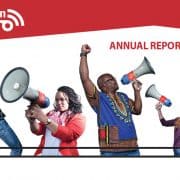|
Getting your Trinity Audio player ready...
|
Corruption Watch (CW) has expressed great concern over the growing levels of corruption and the lack of political will by key political and governmental leaders to confront corruption. The Corruption Watch 2014 report reveals that 8 181 corruption reports have been lodged with the organisation since its establishment in 2012.
“The situation is really dire. While we have an impressive array of laws and institutions dedicated to combatting corruption, the reality is that many of our leaders act with absolute impunity. This brings the laws into contempt and erodes public trust in the institutions” said David Lewis, executive director at Corruption Watch.
This is amply demonstrated by the on-going saga around Nkandla, the disarray in the criminal justice system, the manner in which officials are routinely scapegoated to cover for the actions of their leaders, and the increasing perception among the public that lack of service delivery is linked to corruption.
There has been a steady increase in the number of reports received by CW in 2014; the organisation has seen a 17% spike in reports from the public, as against the previous year. The 2014 data indicates that an average of seven reports a day were received, totalling 2 714 reports in 2014. Of these, 56% were classified as corruption within CW’s mandate. .
“The influx of reports evidences the positive response we have received from the public, and is an indication that people have had enough and are starting to object to what is going on around them. We are also affirmed by the continued willingness of public sector employees to report corruption in their own ranks. It gives us confidence that the fight is worth fighting,” added Lewis.
The Gauteng province continues to dominate the provincial charts, constituting 44% of the complaints received in 2014, up by 6% from the 38% in 2013. KwaZulu-Natal followed at some distance with 16%, up from 13% in 2013, whereas in the Free State, the number of complaints received decreased from 14% in 2013 to 10% in 2014.
The 2014 report also reveals that abuse of power is the most prevalent type of corruption which constitutes 41% of all the complaints received in 2014.
The most dominant sectors exposed by the reporters include schools, traffic and licensing, immigration and housing.Through its reports and meetings with groups of stakeholders, Corruption Watch has increasing evidence of a growing number of people willing to actively take part in the fight against corruption. In particular, young people have begun to show interest in joining the struggle against corruption.
A Corruption Watch survey conducted via Mxit revealed that 84% of South African youth involved in the study were concerned about corruption. Out of over 6 000 respondents between the ages of 14 and 34 who participated in the survey, over half claimed that they would like to take part in an anti-corruption campaign.
“As a result, this year we will be focusing on amplifying the voice of the youth. We approach the youth on the basis that they are innovators, the leaders of today, not the leaders of tomorrow. There is no reason to expect that they will not play a leading role in the struggle against corruption.”
Download this press statement as a PDF.
For more information:
David Lewis – 082 576 3748
Lucky Ronald Menoe – 072 577 8419
Moira Campbell – 083 995 4711
The Corruption Watch 2014 report reveals that 8 181 corruption reports have been lodged with the organisation since its establishment in 2012.. The organisation has expressed great concern over the growing levels of corruption and the lack of political will by key political and governmental leaders to confront the problem.






